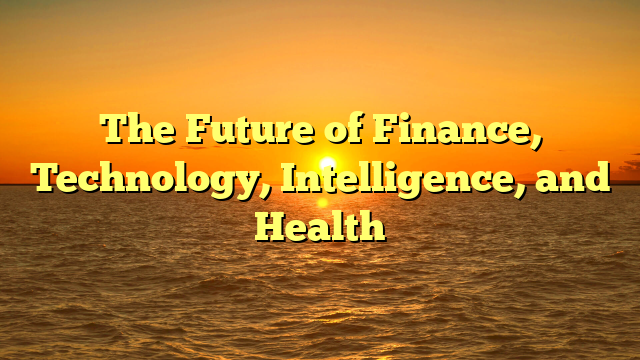In the current age, the convergence of financial markets, technology, intelligence, and medical breakthroughs is creating a new paradigm for how we live, work, and think. As we look ahead, it’s important to recognize how these domains influence each other and contribute to a more integrated world.
Finance: The Backbone of Economic Stability
At its core, finance serves as a critical element in economic development. It includes everything from loan systems to investment management, providing the tools necessary for businesses and individuals to prosper. The growing popularity of blockchain technologies and other decentralized systems is reshaping how financial transactions are conducted and opening new avenues for wealth generation.
The finance industry has undergone significant transformation, thanks to the rise of fintech. New technologies allow for greater access to financial services, such as automated portfolio management and online lending, often reducing the barriers to entry for consumers. Machine learning and AI applications are also helping banks and investors make data-driven decisions, minimizing risk and maximizing profitability.
Technology: Shaping the World of Tomorrow
Technology is not only changing the way we live but also driving advancements across every sector, including healthcare, education, and transportation. Innovations like next-generation wireless technology, the smart devices, and quantum computing are expected to have a transformative impact on industries and societies worldwide.
In the realm of healthcare, the integration of technology is improving both the quality and accessibility of care. remote healthcare services allows patients to consult with doctors from the comfort of their homes, while wearable health devices are helping individuals monitor their well-being in real-time. AI-driven diagnostics and personalized treatment plans are also promising to reduce medical errors and improve patient outcomes.
Intelligence: The Role of Artificial Intelligence in Modern Society
Artificial Intelligence (AI) is one of the most exciting fields of the 21st century, with the potential to drastically change the way we work and live. AI systems are already being used in finance, healthcare, and manufacturing to streamline processes and enhance productivity. These systems are capable of learning from vast amounts of data, making them more effective at predicting trends and identifying patterns than humans.
AI technology is revolutionizing fields like healthcare and finance by providing new ways to improve operations. AI systems are already assisting doctors in diagnosing diseases by analyzing medical data faster than human specialists. In finance, AI algorithms can predict stock market trends and make automated trading decisions. As AI continues to develop, its applications will expand, unlocking even more opportunities for both industries and individuals.
Health: The Integration of Technology for Better Health Outcomes
Medical advancements are pushing the boundaries of what is possible in healthcare. New technologies like minimally invasive procedures are making surgeries more precise, reducing recovery times, and improving patient satisfaction. Moreover, the integration of virtual health consultations is transforming the healthcare landscape by offering patients access to doctors without the need for in-person visits, making care more accessible and affordable.
The future of health is also closely tied to advances in AI-powered health monitoring and biotechnology. Wearable devices, such as smartwatches and fitness trackers, are providing real-time data on an individual’s health, while AI is enabling personalized medicine and treatments tailored to a patient’s specific needs. slot gacor help in early diagnosis but also allow for the optimization of long-term health outcomes.
Conclusion: Towards an Integrated Future of Finance, Technology, Intelligence, and Health
Looking ahead, the convergence of finance, technology, intelligence, and health presents immense opportunities. By leveraging technological advancements, we can improve financial systems, optimize healthcare, and expand the capabilities of artificial intelligence. However, it’s essential to remain vigilant about the challenges these technologies may pose and work toward solutions that ensure equitable benefits for everyone.
In conclusion, understanding the dynamics between these sectors and their future implications will be key to navigating a rapidly changing world. Whether it’s through improved health outcomes, smarter financial management, or more advanced technology, the continued collaboration of these fields promises to create a brighter and more sustainable future for all.



